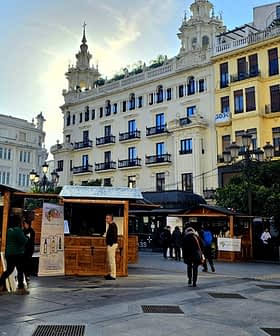Consecrated Oil for King Charles III Coronation Arrives in London
Olive oil used in the coronation was produced from handpicked olives and blessed by religious officials in Jerusalem.
 (Getty Images)
(Getty Images) The sacred olive oil to be used at the coronation of King Charles III at Westminster Abbey in London on May 6th has arrived from Jerusalem.
The oil was produced from the hand-picked fruit of two olive groves on the Mount of Olives in the Orthodox monasteries of Mary Magdalene and Ascension of the Lord, where King Charles’ grandmother is buried.
The anointing oil for King Charles and the royal family was consecrated in a special ceremony by the Patriarch of Jerusalem Theophilus III and the Anglican Archbishop of Jerusalem Hosam Naoum.
See Also:Third-Generation Producer Brings the World’s Best Olive Oils to LondonThe announcement was made by Buckingham Palace, which considers the ceremony a fundamental step in anticipation of King Charles’ ascension to the throne.
Reflecting on the event, the Archbishop of Canterbury, Justin Welby, thanked Patriarch Theophilus “for providing the oil for this coronation, which reflects the King’s personal family connection with the Holy Land and his great concern for its peoples.”
He noted that from the very beginning of the planning of the coronation, he wanted “the new coronation oil to be made from olive oil from Mount of Olives.”
According to the archbishop, the fact that the oil is made from olives harvested from the Mount of Olives “shows the deep historical connection between the coronation, the Bible and the Holy Land.”
“From the ancient kings to the present day, monarchs have been anointed with oil from this holy place,” Welby added. “Now, as we prepare for the anointing of the King and Queen Consort, I pray that they will be guided and strengthened by the Holy Spirit.”
The anointing ceremony will take place as part of the coronation. Traditionally, oil is poured from an ampoule onto the 13th-century silver coronation spoon, and then the ruler’s hands, breasts and head are anointed with the oil.
The oil is produced according to a centuries-old recipe used in the anointing of Charles’ mother, Queen Elizabeth II, in 1953, but with one important difference.
The coronation oil of the late queen included a blend of oils of orange, rose, cinnamon, musk and ambergris, a substance derived from sperm whale intestine.
Charles’ oil blend is made with sesame, rose, jasmine, cinnamon, neroli, benzoin, amber and orange blossom oils, with no animal ingredients. The same oil will be used to anoint Queen Camille.








